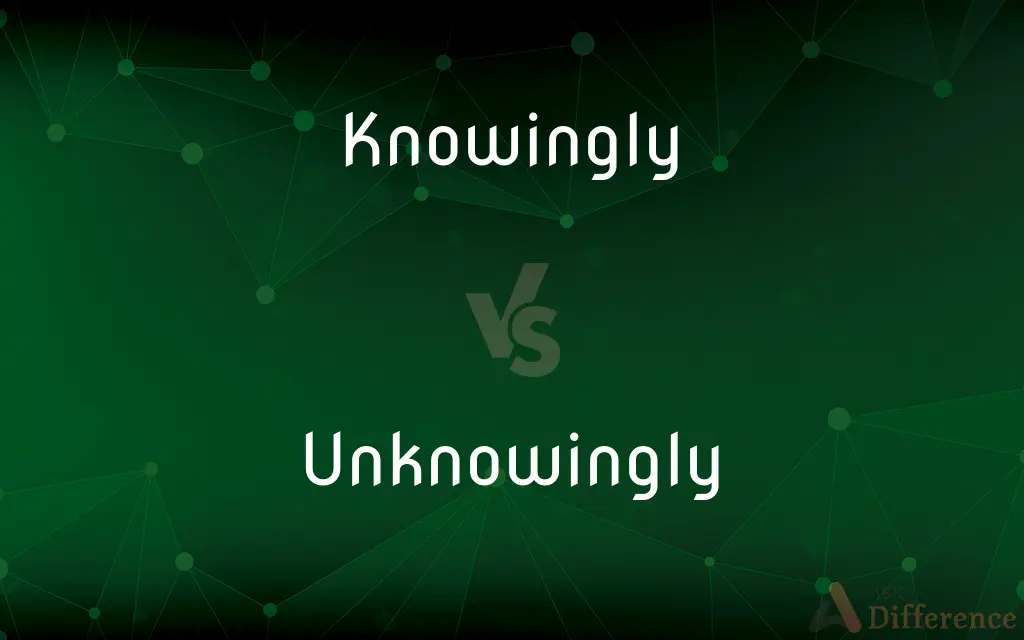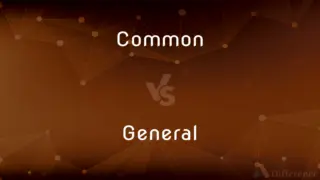Knowingly vs. Unknowingly — What's the Difference?
By Tayyaba Rehman — Updated on September 26, 2023
"Knowingly" means to do something with knowledge or intention, whereas "Unknowingly" refers to acting without awareness or doing something inadvertently.

Difference Between Knowingly and Unknowingly
Table of Contents
ADVERTISEMENT
Key Differences
"Knowingly" and "Unknowingly" are adverbs that signify the level of awareness or intention in performing an action, with "Knowingly" implying conscious awareness or deliberateness, and "Unknowingly" suggesting a lack of awareness or inadvertence. When someone acts "knowingly," it denotes that the person is fully aware of their actions and the potential consequences. Conversely, when someone acts "unknowingly," it implies that the person is not aware of their actions, often leading to unintentional outcomes.
To use "knowingly" is to imply that an action is taken with full knowledge, understanding, and intent, reflecting a deliberate choice or decision. It usually connotes a degree of responsibility on the part of the actor for the consequences that may arise from such actions. On the other hand, "unknowingly" typically implies that actions are taken without realization or conscious intent, often excusing the actor from full responsibility due to the lack of awareness or intent.
In legal contexts, "knowingly" can have significant implications, as it often denotes that an individual acted with intent and awareness, potentially impacting judgments and liabilities. In contrast, "unknowingly" in legal contexts may mitigate liabilities, as actions taken without knowledge or intent are generally viewed less severely, reflecting the principle that there is less moral culpability when there is no intent to cause harm.
The distinction between "knowingly" and "unknowingly" is pivotal in everyday language, legal discourse, and moral philosophy, allowing for nuanced expressions of intent, knowledge, and responsibility. "Knowingly" underscores deliberateness and consciousness in action, often attributing moral and legal responsibility, while "unknowingly" conveys inadvertence and lack of awareness, typically diminishing the degree of responsibility attributed to the actor.
Comparison Chart
Awareness Level
High awareness, implies intention
Lack of awareness, implies inadvertence
ADVERTISEMENT
Implication of Intent
Action is taken with conscious intent
Action is taken without conscious intent
Legal Implications
Can signify culpability due to awareness and intent
Can mitigate liability due to lack of awareness and intent
Degree of Responsibility
Typically implies higher responsibility for outcomes
Typically implies less responsibility due to lack of intention
Common Connotations
Deliberate, conscious, intentional
Inadvertent, unintentional, accidental
Compare with Definitions
Knowingly
Denotes conscious awareness of one’s actions.
He knowingly accepted the risks involved.
Unknowingly
To act without awareness or realization.
She unknowingly dropped her keys.
Knowingly
Implies intention and deliberateness.
She knowingly misled them.
Unknowingly
Implies lack of intent or conscious knowledge.
He unknowingly insulted her.
Knowingly
To act with full knowledge.
He knowingly violated the rules.
Unknowingly
Denotes inadvertent actions.
They unknowingly spread misinformation.
Knowingly
Can reflect a deliberate choice or decision.
He knowingly opted for the more challenging path.
Unknowingly
Reflects absence of deliberate choice or decision.
He unknowingly signed a faulty contract.
Knowingly
Possessing knowledge, information, or understanding
Very knowing about transportation costs.
Unknowingly
To do something without deliberate intention.
She unknowingly walked into a restricted area.
Knowingly
Showing clever awareness and resourcefulness; shrewd and worldly
"Even so knowing a young ruffian as William Chaloner would have had no preparation for the shock of London" (Thomas Levenson).
Unknowingly
Not knowing; unaware.
Knowingly
Suggestive of secret or private knowledge
A knowing glance.
Unknowingly
Without awareness, without intent.
Knowingly
Deliberate; conscious
A knowing attempt to defraud.
Unknowingly
Without knowledge or intention;
He unwittingly deleted the references
Knowingly
(Archaic) Fashionable; stylish
"Many young men ... drove about town in very knowing gigs" (Jane Austen).
Knowingly
In the manner of one who knows.
She smiled knowingly, but kept the secret.
Knowingly
With knowledge of all relevant facts.
We keep our prices low and are never knowingly undersold.
Knowingly
With knowledge; in a knowing manner; intelligently; consciously; deliberately; as, he would not knowingly offend.
Knowingly
By experience.
Knowingly
With full knowledge and deliberation;
He wittingly deleted the references
Knowingly
To do something with awareness of the potential consequences.
She knowingly chose to take a controversial stance.
Common Curiosities
What does "knowingly" imply about awareness?
"Knowingly" implies high awareness and intention in performing an action.
What does "unknowingly" signify regarding awareness?
"Unknowingly" signifies a lack of awareness or conscious intent in performing an action.
Can "knowingly" denote responsibility for outcomes?
Yes, "knowingly" typically implies a higher degree of responsibility for the outcomes of one's actions.
Does "unknowingly" often imply less responsibility?
Yes, "unknowingly" typically implies less responsibility due to the absence of intent or awareness.
Can "unknowingly" mitigate liabilities in legal contexts?
Yes, "unknowingly" can often mitigate liabilities in legal contexts due to the lack of intent and awareness.
Is "unknowingly" associated with accidental actions?
Yes, "unknowingly" is often associated with accidental, unintentional actions.
Does "unknowingly" reflect the absence of deliberate choice?
Yes, "unknowingly" reflects the absence of deliberate choice or decision.
Is "knowingly" used to signify deliberate actions?
Yes, "knowingly" is used to signify deliberate, intentional actions performed with awareness.
Does "knowingly" imply moral or legal culpability?
Yes, "knowingly" can imply moral or legal culpability due to the presence of intent and awareness.
Does "knowingly" imply consciousness in actions?
Yes, "knowingly" implies a high level of consciousness and deliberateness in one's actions.
Can "knowingly" reflect a deliberate decision or choice?
Yes, "knowingly" can reflect a deliberate decision or choice made with full knowledge.
Can "unknowingly" refer to inadvertent actions?
Yes, "unknowingly" often refers to inadvertent, unintentional actions performed without realization.
Can "knowingly" denote conscious acceptance of risks?
Yes, "knowingly" can denote conscious acceptance of risks and potential consequences.
Does "unknowingly" imply lack of conscious knowledge?
Yes, "unknowingly" implies performing actions without conscious knowledge or intent.
Can "knowingly" and "unknowingly" be used to express nuanced levels of intent and awareness?
Absolutely, "knowingly" and "unknowingly" provide nuanced expressions of varying levels of intent, awareness, and responsibility in actions.
Share Your Discovery

Previous Comparison
Sketch vs. Picture
Next Comparison
Common vs. GeneralAuthor Spotlight
Written by
Tayyaba RehmanTayyaba Rehman is a distinguished writer, currently serving as a primary contributor to askdifference.com. As a researcher in semantics and etymology, Tayyaba's passion for the complexity of languages and their distinctions has found a perfect home on the platform. Tayyaba delves into the intricacies of language, distinguishing between commonly confused words and phrases, thereby providing clarity for readers worldwide.














































